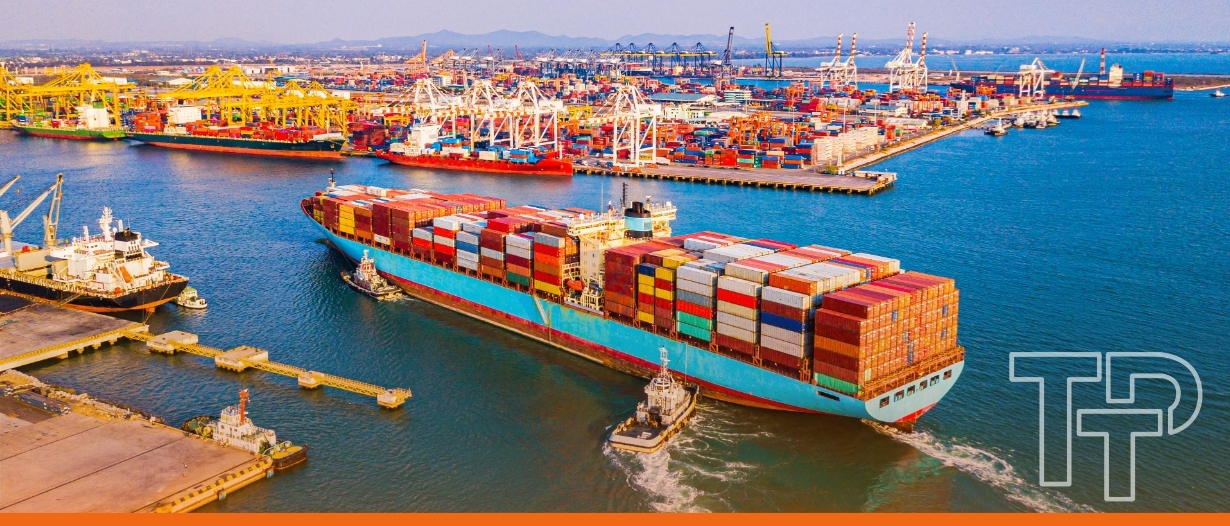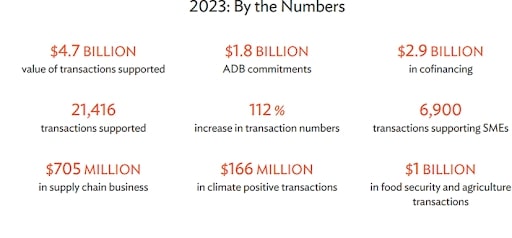VIDEO | BAFT CEO: Charting the course for transaction banking in a fractured world
Tod Burwell
Jun 06, 2025
 Alexander Malaket
Apr 18, 2025
Alexander Malaket
Apr 18, 2025

Trade has become well-established and recognised among practitioners and policymakers as an effective way to support and advance international development and poverty reduction. Multilateral institutions, including multilateral development banks (MDBs), have embraced this perspective, and most leading MDBs today put significant priority on the nexus between trade and development.
Equally importantly, given that 80% or more of international trade depends on some form of trade financing, the role of MDBs in providing trade financing (both traditional trade finance and various forms of supply chain finance) is critical to the trade and development equation.

The policy focus and the program-level priorities of MDBs have evolved materially over the past decade, covering a broad range of activities. Leading MDBs are active in major infrastructure projects at the country level, as well as in promoting and facilitating regional collaboration and even economic integration on a regional basis. Whether an MDB provides long-term project financing, short-term trade finance, or targeted support for a strategically important commercial sector, or the ever-critical small- and medium-sized enterprise segment, such activities are likely to be supported by a complementary portfolio of ‘technical assistance’ or ‘capacity building’ initiatives.
These can include high-quality training programs delivered in-market to raise technical skills in a wide variety of areas, including esoteric specialisms like trade financing. They can, in trade-based development, include supporting partnerships between developing member banks and leading international banks to create net new financing capacity, and to facilitate the sharing of best practices.
While most MDBs have a regionally focused mandate, the geographic lines have blurred somewhat over the several years, though the World Bank and its sister entities—the International Finance Corporation (IFC) being the centre of operations focused on private sector engagement, including trade financing—retain a global mandate.
Over the past decade, the fundamentally important contribution of MDBs has been brought sharply into focus on multiple occasions, even if we limit consideration to “just” the private sector and trade-related activities of the MDBs.
| The Global Trade Finance Program (GTFP) is IFC’s flagship trade finance program, having provided over 188,000 firms with $120 billion of trade finance over the last 20 years. The GTFP supports key strategic priorities, including food security, job creation, climate, and gender, and most of the beneficiary firms operate in IDA countries. In fact, one third of GTFP activities are in agriculture and food, and 40% are in Africa. |
IFC’s Global Trade Finance Program
In trade financing, prior to the global financial crisis (GFC) of 2008, there were serious discussions among leading practitioners about whether there was any real need for entities like public sector export credit agencies or multilateral entities like the MDBs, to continue to provide trade financing. The view beginning to take root was that private sector players could more than meet the needs of the market. The GFC and the global chaos which followed were caused by financial engineering and the related sale of toxic, junk-quality mortgage assets sourced in the United States and marketed globally as high-quality, high-value investments. The implosion of several major brands in finance and resulting concerns about the (then unclear) levels of exposure to these assets caused the interbank lending market to evaporate overnight, likewise devastating critical financing activities linked to international trade.
Trade, and the related economic multipliers, immediately showed the impact of knock-on effects, perhaps most strikingly visible in the mushrooming of empty, stranded cargo vessels in ports across Asia. Beyond that, the crisis and the resulting absence of global liquidity arguably contributed to a longer-lasting crisis in shipping. The GFC surfaced a reality that was known by trade finance practitioners but rarely acknowledged outside this small community: that financing is just as fundamental to the enablement of trade (and trade-based development) as the supply chains that serve as the arteries of global commerce.
Trade finance, that unique and poorly understood branch of finance, plays an indispensable role in facilitating the exchange of goods and services that have advanced societies and global growth for thousands of years.
The GFC clearly and beyond any doubt showed that private sector players cannot be fully counted on—especially in times of crisis—to provide access to essential forms of financing (and related support) to ensure the uninterrupted flow of systemically critical activities like trade. Public good considerations, even when they are directly and visibly connected to urgent human need and imminent suffering, simply do not enter into a commercial calculus.
The MDBs, spurred by the World Trade Organization (WTO) and supported by governments around the world, multiplied the size of their various programs, including their capacity for trade financing, and deployed billions in support of the global trading system. A system that had, until then, led growth and outpaced GDP for close to fifty years but suddenly faced a crisis which it had no part in creating.
The COVID-19 pandemic was a human tragedy of global proportions, with economic impacts unseen perhaps since the great depression. It also demonstrated beyond doubt the importance of maintaining a network of multilateral institutions whose mandates and people are fundamentally centred on service and public good. MDBs like the Asian Development Bank (ADB) stepped up to map the vaccine supply chain, finance the import of vaccines into developing markets, and actively support the import of essential goods.
At times, the mere presence of an MDB in a given market, or its entry into a market, can have an invaluable positive impact through a “Demonstration Effect”: that is, showing private sector players and other stakeholders that it is possible to operate in a country or market in crisis. The European Bank for Reconstruction and Development (EBRD) has done this in Lebanon, and ADB remained in Sri Lanka during its recent political and economic crisis, enabling at least one global bank to support the country in its moment of need.
MDBs, either individually or in collaboration, have taken leadership roles in advancing important policy priorities, but equally in helping to create necessary “enabling conditions” to achieve certain development and inclusion-related or climate-related objectives, among many others. ADB and IFC published a joint “Reference Note” on sustainable trade finance to help clients access trade financing in support of green or sustainable trade flows, and the heads of leading MDBs came together at the urging of their various trade finance program leads to jointly advocate for the deployment of more supply chain financing capacity, in collaboration with the WTO.
Recent high-level dialogue, including in the context of the Indian Presidency of the G20 and B20, sought to highlight the potential to better leverage MDBs to address pressing global issues, including through greater use and deployment of MDB guarantees. If such a vision remains in play, the MDB heads and those “working the problem” need only look to the trade financing expertise within their own organisations, where the use of guarantees helps amplify capacity and leverage private sector capital in support of trade-based development.
With the unconscionable dismantling of USAID and the human toll that will follow, MDBs will again need to step up to help address a crisis, however, the current chaotic political climate raises questions about how the MDB Boards (made up of funding country representatives) will react, and how they may shift the priorities and focus of individual MDBs, and even of the global community of multilaterals.
One positive outcome may be a loosening of restrictions on the financing of non-renewable energy, absolute restrictions against which are both hypocritical and impractical and do little to reduce carbon from low-emitting developing economies. Those countries urgently require access to affordable energy sources, and do not have the luxury of financing, at scale, the import of solar panels or the creation of wind farms.
In the end, MDBs need to be able to continue their work as effective crisis response vehicles, and must be supported in their efforts to address various forms of market gaps, including the $2.5 trillion in global unmet demand for trade financing.
Operationally, trade must remain at the heart of development, and trade financing is a crucial enabler of flows through global supply chains, even as those are being reassessed in light of current protectionism and trade war footing.
MDBs will continue to evolve their SCF offerings and should continue to complement core financing activities with a range of enabling initiatives, including ones already underway around digitalising trade, combatting money laundering and terrorism financing, advancing supply chain traceability, and sustainable trade.
MDBs like the Inter-American Development Bank will be important partners in ultimately resolving an ongoing issue in global correspondent banking. Entire regions like the Caribbean, the Pacific, and parts of Africa are currently disconnected from these networks, which are key to the conduct of trade, and critical to trade-based development.
MDB mandates anchored in commitments to public good, coupled with the unique credibility and convening power of these organisations, are more urgently needed today than perhaps at the peak of the worst moments of crisis of the last decade.
MDBs are indispensable in the fight against poverty and imperative to advancing international development. Despite their imperfections, discussions in the coming years cannot center around disengaging from MDBs in trade and trade financing: they must focus on how best to empower MDBs to scale and multiply their contributions and impact.

Tod Burwell
Jun 06, 2025

Carter Hoffman
Jun 06, 2025
Trade Treasury Payments is the trading name of Trade & Transaction Finance Media Services Ltd (company number: 16228111), incorporated in England and Wales, at 34-35 Clarges St, London W1J 7EJ. TTP is registered as a Data Controller under the ICO: ZB882947. VAT Number: 485 4500 78.
© 2025 Trade Treasury Payments. All Rights Reserved.